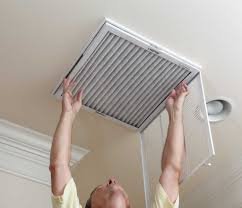Dirty Air Filters Can Affect Your Health
During the summer months, those of us in the desert spend a lot of time indoors. We may get a slight cool-down overnight, but for the most part we spend an average of 90 percent of our time indoors. Unfortunately, much of this indoor air can be stagnant and polluted. The EPA has stated that indoor air is 70% more polluted than outside air. This is among the top public health risks we face on a daily basis.
The air filter is an essential part of your home’s HVAC system. In addition to helping clean the air running through your home, a clean air filter directly affects the efficiency of your HVAC equipment. Air filters are generally made up of pleated fibers that collect the particulates in the air as it flows back through your HVAC system and then distributed throughout your home. An air filter can collect and trap a wide variety of particles that can affect the air quality for your family’s health and comfort. These include:
Microorganisms and bacteria
Animal fur and hair
Lint and other fibers
Mold and mold spores
Pollen
Dirt and dust
Over time, your air filter will become clogged with particulates and will restrict the air flow in your HVAC system. This makes your system work harder to produce the same heating/cooling and directly reduces the efficiency of your HVAC equipment. The system will have to work harder to produce the needed air flow. This will in turn reduce the life of your heating/cooling system and cost you more electricity to run the unit.
You can help alleviate many of these pollutants in your own home by simply changing your HVAC air filter on a regular basis. Unfortunately, this task gets easily forgotten and can significantly affect your home’s air quality. Here are a few tips on how often filters need to be changed and choosing the best fit for your home environment.
How Often Do Air Filters Need To Be Changed?
The simple answer…when it’s dirty. Unfortunately, that is easier said than done. Many air return registers are not in easily accessible areas and it is easy to forget this annoying task. The best way is to put it on a regular schedule that you can align with other home maintenance tasks.
How often you change your air filter depends on the type of filter used, your home’s environment and the season. For example; if you use a disposable filter, have 2-3 pets and it’s during the peak allergy season, you will want to change the air filter every 30-45 days. Some important factors to keep in mind include:
The type of filter your system requires and the manufacturer’s recommended replacement frequency
The overall air quality where you live. Are you near a factory? On a busy street? In the country?
How many pets do you have?
How many people live in your home?
Do you, or any of the people you live with, have allergies?
Benefits of Changing Your HVAC Air Filter
Changing your air filter will result in noticeable changes within your home. Here are some quick benefits of changing your HVAC air filter:
Healthier indoor air free of dust, pollen, allergens and other contaminants.
Increased efficiency (and money savings) because your HVAC system isn’t working twice as hard with slowed down air flow requiring more energy and electricity.
Increased longevity of your HVAC system. The interior of your system will also remain clean, keeping buildup from leading to expensive maintenance or system failure.
It’s environmentally-friendly, because if your system is working harder through slowed air flow and a clogged filter, it uses more energy, electricity and more greenhouse gases are produced.
Choosing the Best Air Filter for Your House
Air filters are segmented based on their material type, and their MERV (minimum efficiency reporting value) rating. MERV rates the overall effectiveness of the air filter — so a higher MERV rating means a finer level of filtration. That means fewer dust particles and other airborne contaminants like pollen and pet hair can pass through.
To put it in perspective, home HVAC systems do well with a MERV rating between 8 and 13.
In Conclusion…
Find the best air filter that works best for your home’s environment and your family needs. But more importantly, change your air filter on a regular pre-determined schedule. Even an expensive air filter can cause poor air quality if it never gets changed. Many times the best choice is a cheap disposable filter changed on a consistent monthly basis.
AmeriSpec Inspection Services can give you good insight on your HVAC system with an annual home inspection. Call us at 480-518-3589.



